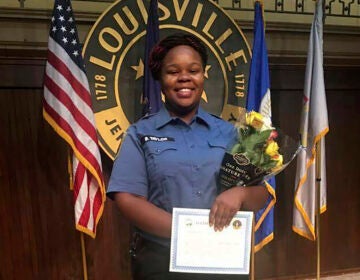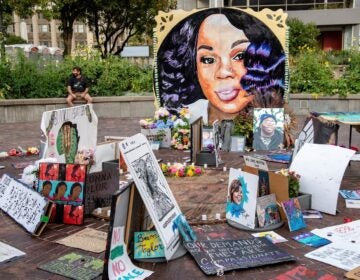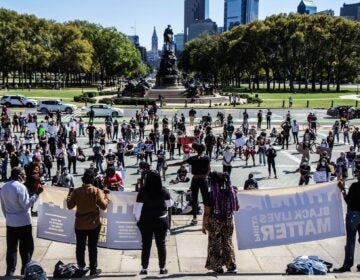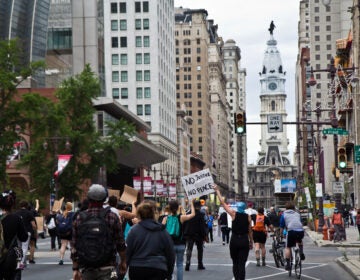Protesters march through Center City following grand jury decision in Breonna Taylor case
Demonstrators marched from Independence Hall to a planned rally at City Hall Wednesday evening, chanting “no justice, no peace.”
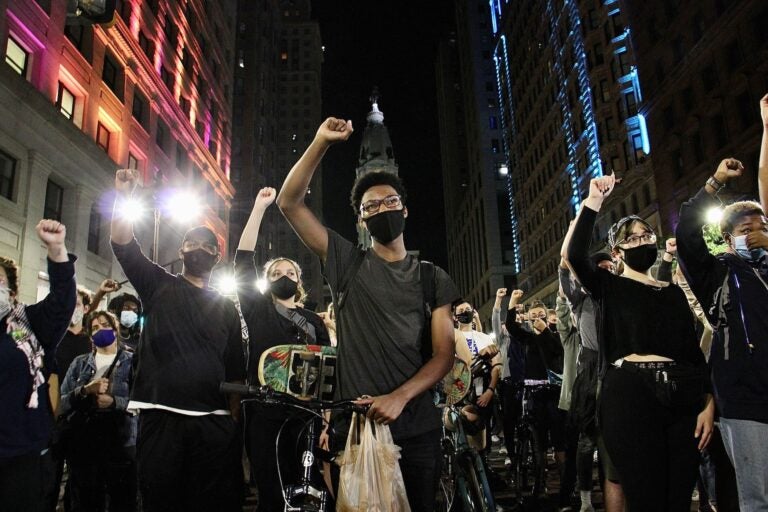
Protesters march south on Broad Street. About 200 participated in the action after a grand jury in Louisville, Ky., failed to bring charges against the police officers who killed Breonna Taylor. (Emma Lee/WHYY)
Updated: 8:45 p.m.
Roughly 200 protesters rallied at Philadelphia City Hall Wednesday evening after a Kentucky grand jury brought no charges against the Louisville police officers who fatally shot Breonna Taylor.
The grand jury decided that two officers who shot Taylor during a March drug raid gone wrong were justified in using force to protect themselves, while charging a third officer, Brett Hankison, with three counts of wanton endangerment for firing into the homes of Taylor’s neighbors — charges that carry a sentence of up to 5 years.
The grand jury’s decision drew swift anger and sadness from many Americans, and protests broke out in Louisville and other cities.
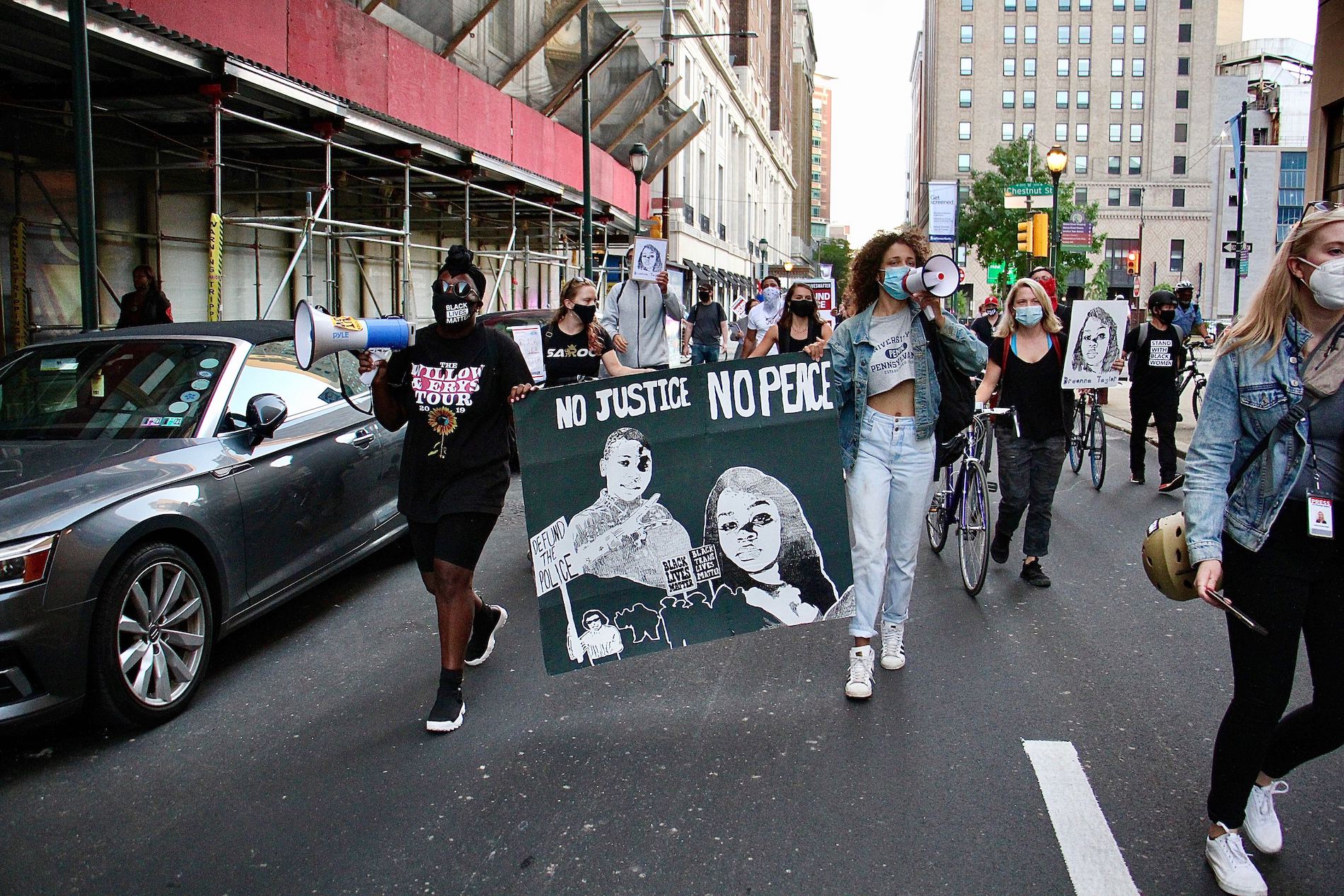
Around 7:45 p.m., the crowd in Philadelphia began marching and chanting down Broad Street, escorted by police officers on bicycles.
Protest on the move again. South down broad. pic.twitter.com/tEnSNPZ3Fi
— Avi Wolfman-Arent (@Avi_WA) September 23, 2020
The group took a meandering path through Center City, turning east onto Locust Street, passing people seated at restaurant sidewalk tables, some of whom raised their fists in the air in solidarity with the protesters. Then the group marched to Market Street before eventually making its way back to City Hall.
Haven’t seen any Interaction yet between protestors and police. March now headed north on 11th.
— Avi Wolfman-Arent (@Avi_WA) September 24, 2020
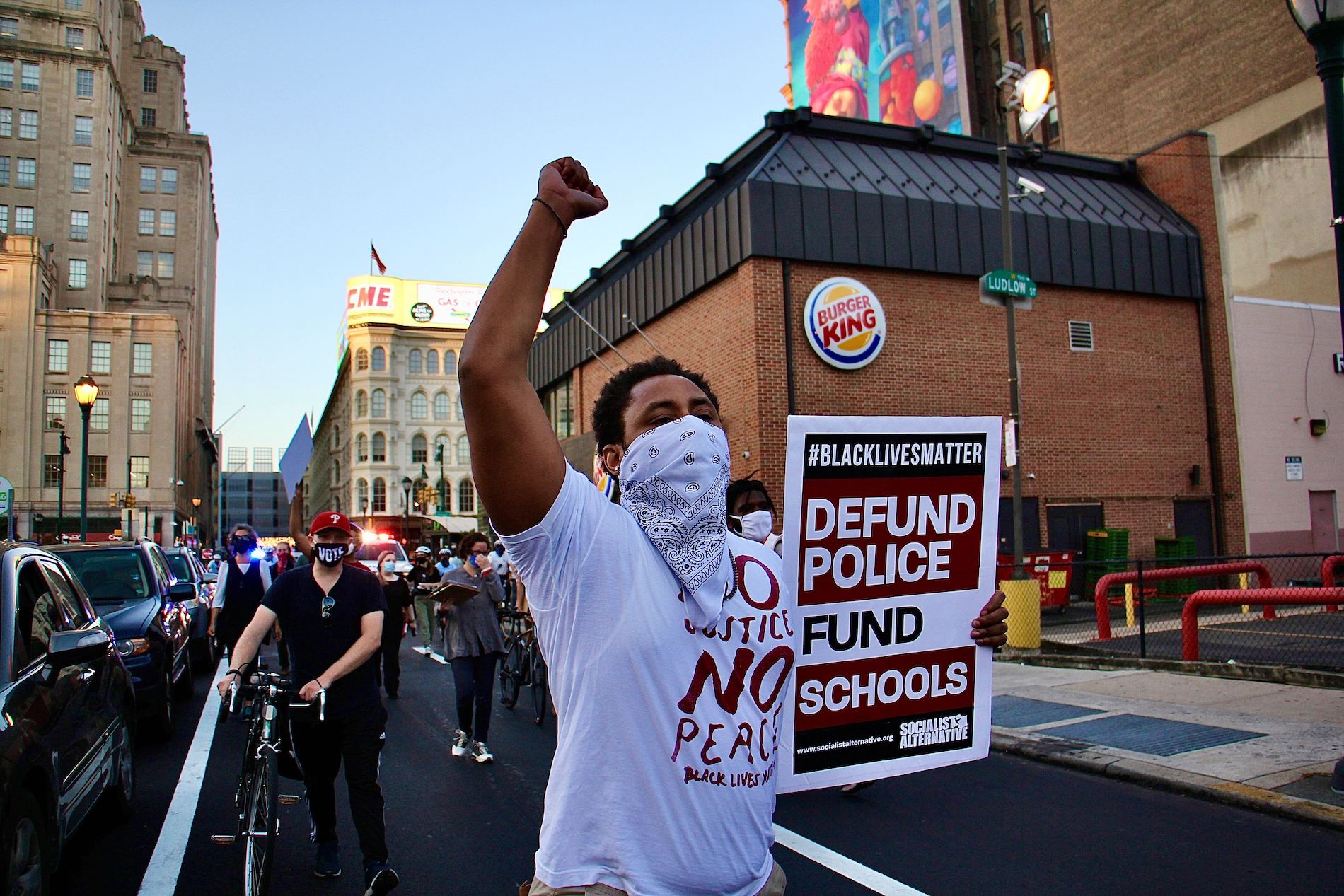
Philadelphia resident Brianna W., 29, said she was following the news of the grand jury decision all morning and was unhappy with the outcome, but she wasn’t surprised.
“Unfortunately, this is what we have to deal with as Black people. There’s never any justice for us,” she said. “So it angers you even more because it never seems like it’s going to change.”
She also said sharing a first name with Breonna Taylor brings her fatal shooting by police even closer to home.
“What’s the difference between that Breonna and me? It just makes you a little more nervous. It could’ve been me,” she said.
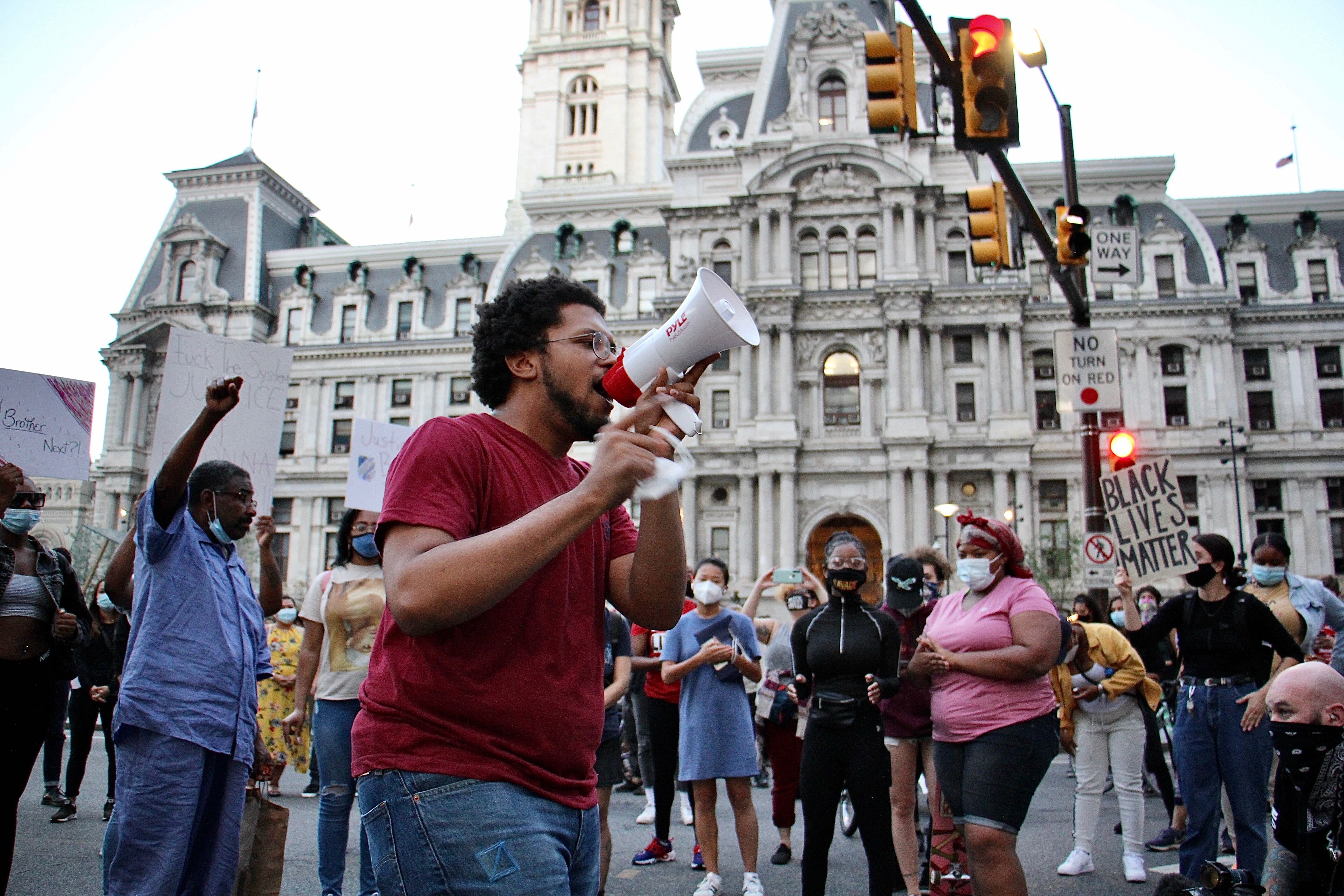
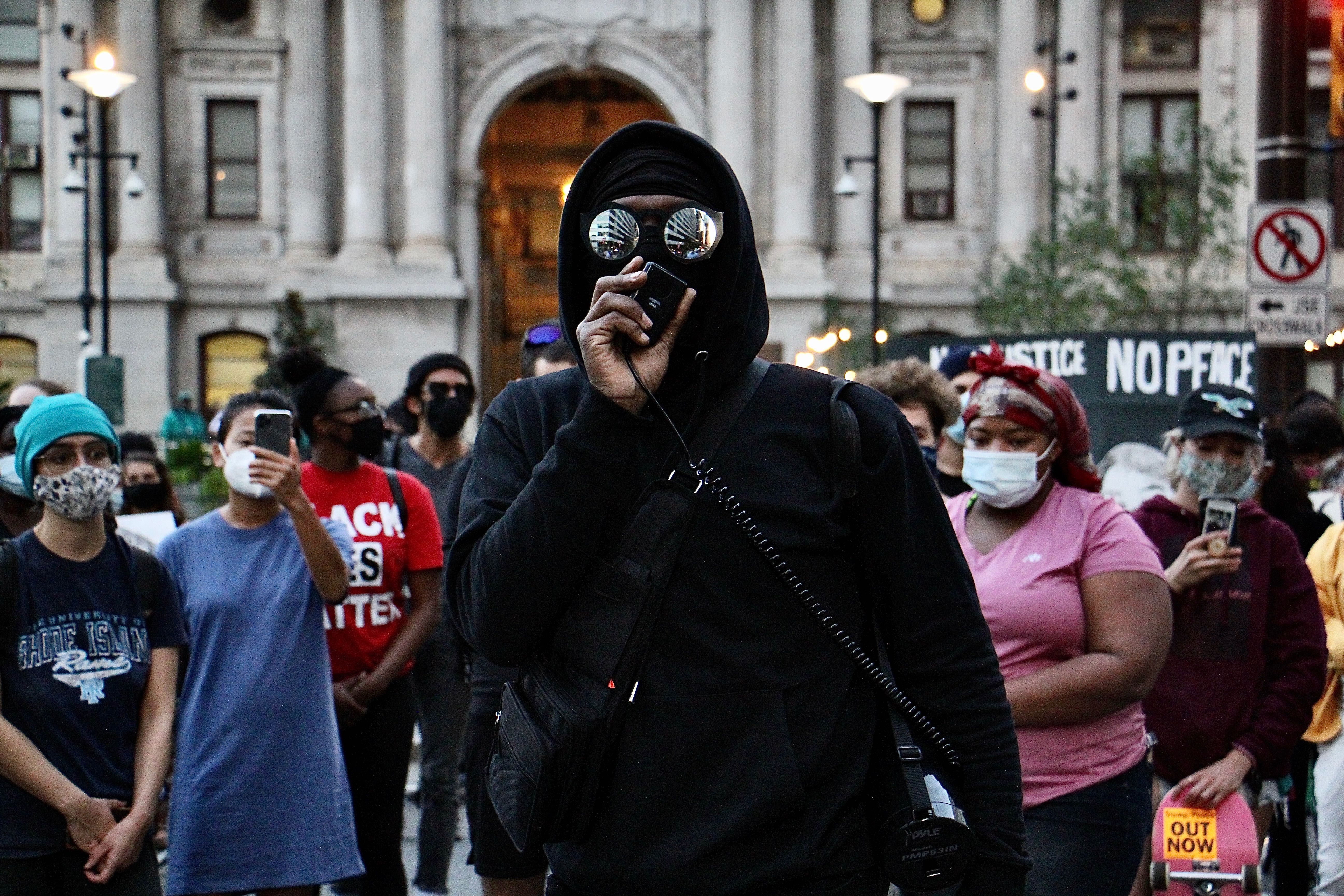
Jabri Gallman, 19 of Philadelphia, said he decided to check out the protests with his friend, 20-year-old Isaac Sawyer of Northeast Philly. Gallman and Sawyer both said they feel disillusioned by the continued protests, and question whether they can produce meaningful change.
“I hope these race soldiers get charges pressed on them,” said Gallman. “I stick with the whole defunding the police initiative, and I also stick with punishing white supremacy, too, because this is going to happen again. It’s only a matter of time, probably going to give it another week, you know, and sitting around here and doing all this isn’t going to do nothing.”
Asked what he meant by “race soldiers,” he said, “I mean white supremacists who are posing as cops, those who work with white supremacist groups, those who believe they are over Black people.”
Sawyer agreed, adding that Black people need to take the protests a step further and target economic institutions that uphold white supremacy.
“If they are just going to kill us in the street, and then we just go back and support the institutions, whether it be Walmart or even the banks around here, nothing is going to change,” Sawyer said.
Marchers holding moment of silence for victims of police brutality. pic.twitter.com/nNrJbTuAae
— Avi Wolfman-Arent (@Avi_WA) September 24, 2020
Linda Noonan, a pastor at Chestnut Hill United Church, attended the rally in her white clerical collar as a “movement chaplain,” a religious leader standing for racial justice and offering support to protesters, she said.
As a religious leader, Noonan said she prays with her feet, calling back the words of Rabbi Abraham Heschel, who marched with Martin Luther King, Jr.
“I believe that people are at the end of the rope in terms of expecting justice from the criminal justice system,” Noonan said, “And every time there has been a violation on the part of police, we really do expect the courts to render justice and when they don’t, it’s just a message to all of us that there is no justice possible really in our criminal justice system.”
Niki LaGrone said she came out to the protest because Breonna Taylor did not get justice, “point blank, period.”
“I don’t actually believe in the carceral state, but as long as we have it and as long as cops are putting people in it, then we put them right where they put other people,” said LaGrone, who is originally from California, but has lived in Philadelphia for 15 years.
“That’s gotta go both ways. That’s what has to happen. They should be charged with the crime they committed: murder.”
LaGrone said since she started attending the protests against racial injustice in June, she has become more radicalized in her beliefs around abolishing police and the criminal justice system.
“As long as we’re locking up Black people, brown people, Indigenous people, trans people in these same jails for crimes that have nothing to do with hurting other beings, then yeah, the people we entrust with our public safety can go spend some time in those systems they created and maintain and defend and justify,” she said.
It was not immediately clear who organized the demonstrations, though several speakers were from the Party for Socialism and Liberation.
City officials announced Wednesday afternoon they were preparing for protests and planned to boost the police presence in Center City and other commercial corridors around the city.
“I know that many Philadelphians are feeling disappointed, frustrated, and even outraged, following today’s announcement by Kentucky Attorney General Daniel Cameron,” Mayor Jim Kenney said in a press release. “The City of Philadelphia fully supports the First Amendment rights of our residents, but we also want to ensure that any demonstration activity that happens is done in a safe, lawful manner.”
Taylor, an emergency medical worker, was shot multiple times by officers who entered her home using a no-knock warrant during a narcotics investigation. The warrant used to search her home was connected to a suspect who did not live there, and no drugs were found inside. The use of no-knock warrants has since been banned by Louisville’s Metro Council.
Taylor’s death — and the release in late May of the 911 call by Taylor’s boyfriend — marked the beginning of weeks of protests in Louisville and nationwide, fueled by her shooting and the death of George Floyd while in police custody in Minneapolis on May 25.
The Associated Press contributed reporting.

Get daily updates from WHYY News!
WHYY is your source for fact-based, in-depth journalism and information. As a nonprofit organization, we rely on financial support from readers like you. Please give today.


